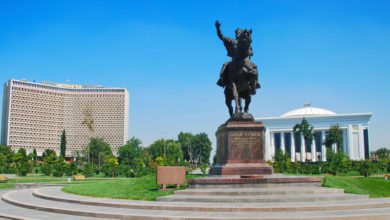Azerbaijan Election: Stability at the Crossroads of Europe and Asia

The parliamentary poll held in Azerbaijan on February 9th has thrown up few surprises. In a country that stands out for stability in a troubled neighborhood, this was only to be expected. What the election has ensured is stability at the crossroads of East and West. With growing tensions in the Middle East, Russia’s confrontational stance, and China’s increasingly authoritarian grip on Central Asia, Western countries are glad that Azerbaijan remains one bright spot: a strategic ally of the West that continues to grow economically.
The election has also made it clear that the country’s reform agenda is here to stay. With a new generation of lawmakers coming to the forefront, the pace of reforms is expected to pick up.
Preliminary results showed the ruling Yeni (New) Azerbaijan party won a renewed majority with 65 seats out of 125 in the country’s parliament, the Milli Majlis.
Over five million voters were eligible to cast their choice between 1,324 candidates, including 299 women, from 19 political parties. More than 1,000 webcams were installed for online monitoring of polling stations.
“We felt that everything was done nicely and smoothly,” said Nabil Ayad, Director of the Diplomatic Academy of London, and a member of the British election observer delegation. “This is part of the democracy building process in this country.”
The parliamentary election was monitored by over 77,000 local and 842 international observers representing 56 international organizations from 55 countries.
Ettore Licheri, an Italian election observer who is the Chairperson of the EU Policies Committee, said that the EU sees Azerbaijan as a model that combines Western and Middle Eastern culture, while maintaining peace and wealth. “It is a very young democracy that only gained its independence in 1991 and people were focused and passionate at the polling stations.”
The election was held nine months early as part of President Ilham Aliyev’s reform programme, in support of the young western-educated administrators appointed by him to accelerate reforms. In the past year several new faces trained at prestigious western universities, such as Harvard, Oxford and the Sorbonne, have been appointed to key positions in the administration.
Aliyev has promoted this new generation of young politicians to help run the economy and his presidential team, signalling that he will not allow vested interests or entrenched ministers to slow his reform programme.
He appointed economist Ali Asadov as prime minister in October 2019. The presidential administration has also seen a major reshuffle, with 44-year old Duke University alumnus Samir Nuriyev made its chief, and former vice-presidential aide Anar Alakbarov and former SOFAZ executive and Harvard alumnus Shahmar Movsumov appointed as assistants to the president. A graduate of the McGeorge School of Law, Tax Minister Mikayil Cabbarov was promoted to Economy Minister last year.
This top-down change of guard in the country’s institutions has been effective in speeding up the pace of reforms and in implementing modern systems to end corruption.
Strategically located at the crossroads between Europe and Asia, Azerbaijan is a global transit hub, and a key player in the North-South and East-West transport corridors. Initiated by Azerbaijan, the Baku-Tbilisi-Kars railway that connects Azerbaijan, Georgia and Turkey became operational in October 2017. It makes Azerbaijan an integral part of the logistics and transport routes between China and Europe. Azerbaijan also built the largest port in the Caspian Sea, the Baku International Sea Commercial Port, that was commissioned in May 2018.
The country has been a consistent and reliable ally of the West for decades. Apart from providing oil to Europe, Azerbaijan successfully completed the Trans-Anatolian Natural Gas Pipeline (TANAP) with Turkey in November 2019 to transfer Azerbaijani gas to Europe.
To capitalize on Azerbaijan’s strategic location, President Aliyev has made his country a beacon of stability and predictability in an otherwise troubled region. In particular, Azerbaijani society is well known for its religious tolerance, a Muslim-majority country that is also home to Christians, Jews and many other confessions.
In contrast, political turbulence continues to rock neighboring Armenia. After the revolution in 2018, Armenia’s new administration has taken an authoritarian approach by attacking the country’s judiciary. Armenian prime minister Nikol Pashinyan even plans a referendum in April to take powers away from the Constitutional Court, a step criticized as “illogical, illegal and unconstitutional” by the opposition.
Armenia still occupies the Azerbaijani province of Nagorno-Karabakh and adjoining areas after nearly three decades, despite four UN resolutions calling for the immediate and unconditional withdrawal of Armenian forces. A resolution to the conflict seems elusive.
Azerbaijan nevertheless has its sights firmly fixed on the future. The new generation stepping in to carry the flame of reforms forward has ambitious plans to further modernize its economy and diversify away from oil and gas to a more sustainable economy. This will further appeal to European countries with which Azerbaijan shares increasingly strong ties.
Source: Geopolitical Monitor





